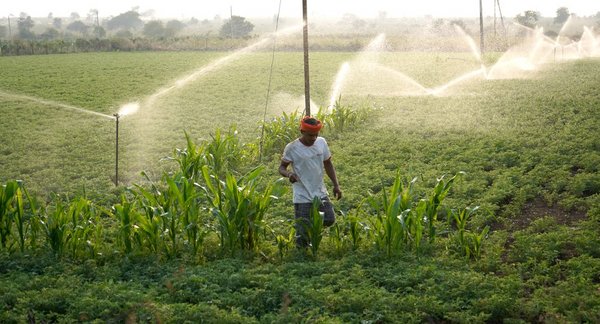- Share this article
- Subscribe to our newsletter
Reduced cropping intensity in India
Groundwater depletion is likely to reduce cropping intensity over the coming years in India, an international research team warns. India is the world’s second-largest producer of wheat and rice and is home to more than 600 million farmers.
The country has achieved impressive food-production gains since the 1960s, due in part to an increased reliance on irrigation wells, which allowed Indian farmers to expand production into the mostly dry winter and summer seasons. But now, India, that produces 10 per cent of the world’s crops, is the world’s largest consumer of groundwater, and aquifers are rapidly becoming depleted.
Indian government officials have suggested that switching from groundwater-depleting wells to irrigation canals, which divert surface water from lakes and rivers, is one way to overcome projected shortfalls.
In a study published in the journal Science Advances, scientists conclude that a switch to canal irrigation will not fully compensate for the expected loss of groundwater in Indian agriculture.
Water shortage likely to reduce winter cropped acreage
The authors estimate that if Indian farmers lose all access to groundwater in overexploited regions, and if that irrigation water is not replaced with water from other sources, then winter-cropped acreage could be reduced by up to 20 per cent nationwide. However, that scenario seems highly unlikely and was included in the study only as an upper-bound estimate.
It seems more likely that any future groundwater shortfalls would be at least partially offset by increases in canal irrigation. But even if all Indian regions currently using depleted groundwater switch to canal irrigation, winter-cropped acreage could still decline by 7 per cent nationwide and by 24 per cent in the most severely affected locations, according to the researchers.
Further adaptation strategies are needed
While nearly all Indian farmers plant crops during the monsoon to take advantage of seasonal rains, winter agriculture is mainly reliant on groundwater irrigation and now accounts for 44 per cent of the country’s annual cropped acreage for food grains.
Other adaptation strategies, in addition to canal expansion, are needed to cope with ongoing groundwater losses, the researchers say. The possibilities include switching from winter rice to less-water-intensive cereals, increased adoption of sprinklers and drip irrigation to conserve water in the fields, and policies to increase the efficiency of irrigation canals.
Greater reliance on canals could increase inequities
The study’s worst-case scenario found that winter-cropped area could decrease by up to 20 per cent nationwide and by 68 per cent in the most severely affected regions if farmers lose all access to groundwater and if that irrigation water is not replaced from another source. The expected losses would largely occur in northwest and central India, according to the study.
The researchers also found that increased distance from existing irrigation canals is strongly associated with decreased acreage planted with winter crops. In future, a greater reliance on canals could increase inequities related to irrigation access, say the authors.
In addition, the lakes and rivers that feed irrigation canals rise and fall in response to rainfall variability, unlike deep groundwater wells. So, a greater reliance on canal irrigation in the future would result in increased sensitivity to year-to-year precipitation fluctuations, as well as any long-term trends due to human-caused climate change.
(Cimmyt/ile)
Read more at Cimmyt website





Add a comment
Be the First to Comment